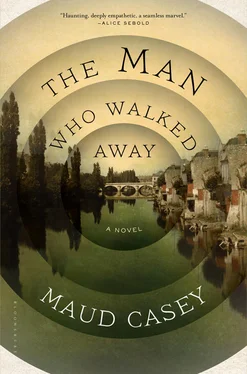He is here , that first time, the urge to walk filling him until he fears he will burst. At first that terrible thirst, so he drank water, so much water, but it wasn’t thirst, so he went outside because he thought it was air he needed. He gulped air until he was dizzy, and when the ache filled his groin, he hid himself at the end of the street and played his cock, his beautiful instrument. Though he played it a number of times, it still didn’t bring relief, and then he discovered himself walking through the tight, winding streets of the city, past the ancient amphitheater where the gladiators fought. The urge walked him out of town through the ancient gate of the city, under the giant clock of the church of St. Eloi as it tolled the hour; it walked him until he became a gladiator too.
The inscription underneath the clock read: J’appelle aux armes. J’annonce les jours. Je donne les heures. Je chase l’orage. Je sonne les fêtes. Je crie à l’incendie. The earth’s tremor rumbled through his shoes and up his shins. He was the whole world and there were the heavens and the angels, there was his mother alive again after being dead for a week that had already lasted years. His bones expanded, making room for it all. He walked until he became ancient; as if he’d always walked, as if all his life his blood had circulated astonishment.
“Where have you been? I have been searching and searching. .” Albert’s father could not find the words. His face was so still; only his hands trembled. “I give you money to buy coke for the gas company. . a day later. . where have you been?” his father said when he discovered Albert, and Albert discovered himself, selling umbrellas for a salesman in the town of La Teste. His father was an even-tempered man, stern but even-tempered, certainly not a man whose hands ever trembled as they did now but he was exhausted — the long walk, the searching, believing he had lost his son forever. “Who is this?” His voice had been rough already from the long, late nights spent caring for Albert’s mother, who’d been sick for months and unable to ever truly sleep until she finally did and never woke up.
That there were years still to go without his mother in them seemed impossible to Albert, and yet there it was, the fact of it, every morning. No mother, no wife, the neighborhood women said. Pity was stronger than the desire to shun; the flip side of the whispering charity was righteousness, and the neighborhood women started to take care of him and his father. They fussed and clucked: My duck cassoulet is famous. It cured my brother of cholera! And besides, it is delicious. It is how I am known — for that and for my generosity. And when the wheelwright’s wife was run over by a carriage and the neighborhood women had someone else who needed their attention, Albert and his father were fine because Albert’s father had always been a good cook anyway and it meant he and Albert didn’t have to be endlessly grateful.
“Who is this?” his father asked again, gesturing to the umbrella salesman. He was a man of folds and layers who seemed to be in the process of swallowing himself.
“An umbrella salesman, sir,” and the umbrella salesman held his round hand, all five sausage-fingers, out to Albert’s father, who glared until the umbrella salesman took his sausage-fingers back and hid away in his pocket.
“I can see that ,” Albert’s father said finally, gesturing to the cart of umbrellas.
“I mistook the boy for an orphan in need of work. I’m only trying to sell an umbrella or two. It helps to have a child.” When Albert’s father’s still face became even stiller, the umbrella salesman changed tack. “But I see now that he could not possibly be an orphan because, well, here is his angry father.” In the umbrella salesman’s reedy voice, Albert heard the danger he had been in. Albert’s father said nothing, only glared, and in that silence Albert heard that the day he had been missing had lasted an eternity for his father.
“Yes, yes,” the umbrella salesman said. “No, no, I’m not at all sure what I was thinking,” already rolling his cart away.
“Albert?” Albert’s father finally looked at Albert, his face a question too.
Albert did not have an answer.
How was he to explain there was a moment while he was walking, silky as mist, when he forgot his father altogether? A moment when he was and he was and he was and he was only here . How could he possibly describe the secret silky song of his body? He could not. He could not. He cannot .
What does it feel like to walk, Albert?
He could not describe it then. He cannot describe it now.
He says nothing in response to the Doctor’s question, the way he said nothing to his father, whose face was still a question, and it was silence for the rest of the way home, where the silence was even thicker with Albert’s mother so recently gone.
And then there was Baptiste waiting for them, sweet boy who smelled of apples and dirt, sweet boy whom Albert would abandon when he was no longer a round, sweet boy but a man as thin as a rail.
Who is Baptiste ?
What could Albert say? “Baptiste is my friend. Baptiste was my friend.”
Albert is a house, and each day the Doctor discovers another door, but sometimes when the Doctor turns the knob, gives it a gentle push, there is a room so full of shame that Albert cannot bear to go inside.
Shh, Albert, shh. Your arms and legs are motionless , and his whole body is quite heavy. You are sleeping , but he is not exactly sleeping. You are disappearing , but he does not disappear; he does not vanish.
Here, his ragged memory.
Here, his lost life not lost at all, though there are parts of it he wishes would stay lost.
He cannot say. He cannot say. He cannot say how dear, loyal Baptiste was waiting for him and his father when they returned to the neighborhood by the river where the cottages seemed shabby only to those who didn’t live there, where the only light at night came from the small gas lamps in the cottages or the gas lamps along the river. When they returned home from La Teste, Baptiste, his smooth round face, innocent of its future, was the only one who would speak to them. He ran over, throwing his arms around his friend, enfolding him in a simple embrace that made Albert want to weep with gratitude.
“You are home, you are home,” Baptiste said, jumping up and down, and it was only when he accidentally landed on Albert’s foot that Albert noticed his feet were covered in blisters. It was only then he noticed the blood.
“He is home,” Albert’s father said sharply, “but he is staying inside.”
Baptiste cupped a grubby hand over the coil of Albert’s ear, whispering so it tickled the inside of Albert’s throat. “Later,” Baptiste whispered. “Tell me your adventure later.”
“Yes,” Albert whispered back, but the chasm had already opened between him and the world. “I will tell you later,” he lied. There would be no explaining.
“Get inside,” Baptiste’s father barked at his son. He was usually kind to Albert and his father, grateful that his odd boy had found another boy just as odd to be his friend, but this time he walked away to join the huddle of fathers on the other side of the street — the varnisher, the wheelwright, the fishermen — without a word. All of the wives, including the whispering women, huddled there too. None of them would look across the street, and Albert’s father shut the door against the night and his gossiping neighbors. It was only later, when the lamplighter arrived on his nightly rounds, when Albert’s father learned what the neighbors’ whispering and pointing was about. “Behind the barrels outside the tavern, the varnisher’s wife discovered him in the middle of. .” Here, the lamplighter paused. “In the middle of indulging himself. That’s what she claims. Who’s to say? She’s a vicious woman. Go gently. You’ve lost your wife, but he’s lost his mother too. He’s just a boy.”
Читать дальше












